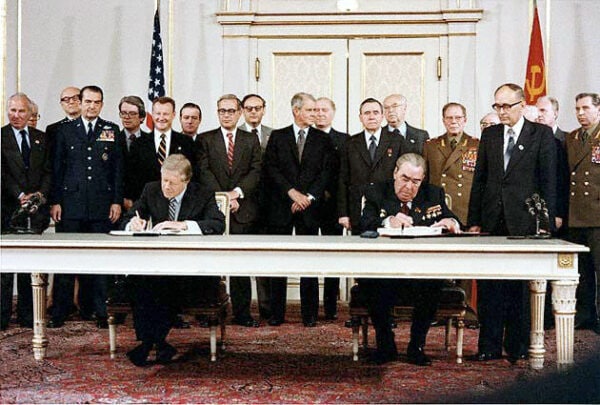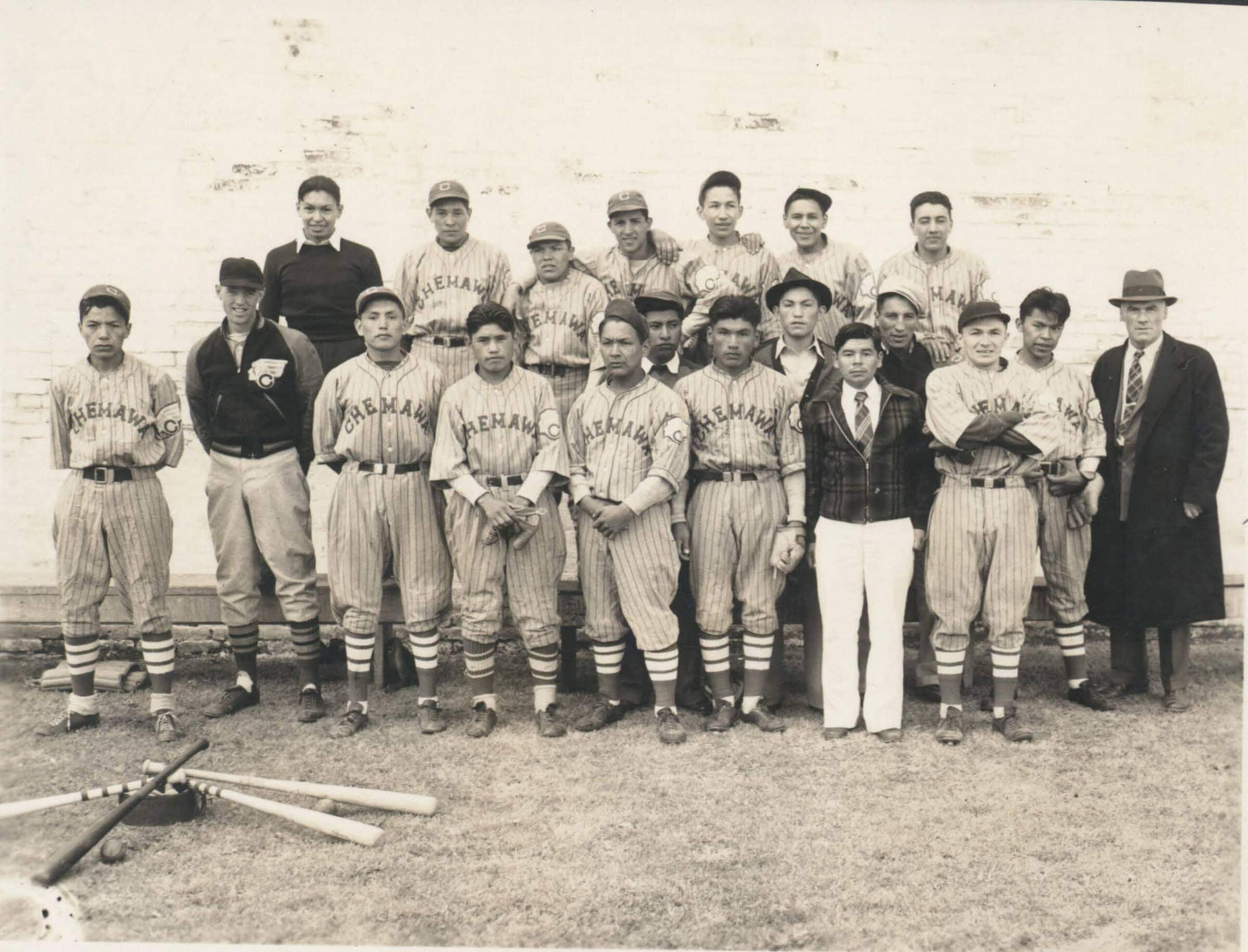
Jimmy Carter and Leonid Brezhnev sign the Strategic Arms Limitation Talks (SALT II) treaty in Vienna in June 1979. Wikimedia Commons
In September 2016, lawmakers in Washington accused Russia of “making a serious and concerted effort to influence the US election.” The accusation came on the heels of growing tensions between Russia and NATO over the conflict in Crimea, and between Russia and the United States over the civil war in Syria. To some observers in the news media, the political game of chess between Washington and Moscow is eerily reminiscent of the Cold War era—a time when diplomacy and maintenance of cooperative foreign relations eventually carried the world away from the brink of mutually assured destruction. This return of Cold War unease has reinvigorated an interest in the past, and those seeking to historically contextualize the present will find an invaluable resource in the latest Foreign Relations of the United States (FRUS) series.
Compiled by the Department of State’s Office of the Historian (HO) and continuously published since 1861, FRUS is a yearly series that documents US foreign policy decisions and diplomatic actions. In 1991, responding to delays in publication and calls for increased transparency, Congress mandated that HO release “a thorough, accurate, and reliable” documentary record of US foreign relations no more than 30 years after a particular event. Since then, in addition to covering the records of the Department of State and the White House, FRUS’s scope has extended to include declassified documents from the Department of Defense, Central Intelligence Agency, Department of Energy, and all Executive Office agencies in the federal government. The documents are hand-selected by HO, which compiles them into a cohesive historical narrative. In 2015, HO released 10 FRUS volumes, including the first-ever volume documenting the Reagan era.
Since 1991, the Advisory Committee on Historical Diplomatic Documentation to the Department of State (HAC) has been overseeing the preparation and timely publication of FRUS, and monitoring the declassification of official records. Comprising representatives from six scholarly organizations—including the AmericanHistorical Association—and three at-large members, HAC produces annual reports on HO’s progress in releasing the FRUS volumes in a timely fashion. Currently chaired by AHA member Robert Immerman (Temple Univ.), HAC recently released its 2015 report, in which it expressed admiration for HO and the “impressive progress” it has made “over the past several years in approaching the 30-year timeline.” The year 2015 was the first time since 2007 that a FRUS volume was published at the 31-year mark, according to HAC.
Why should historians be excited about these new releases? According to Immerman, the recently released FRUS volumes, which highlight US foreign and diplomatic relations from the late 1960s to the early 1980s, “will really be the foundational force that will be used for writing history.” Historians can go through the volumes before visiting the archives and refer to the footnotes to determine which record groups or archival sources to look at, he says. Immerman points out that the documents comprising the FRUS series are usually classified until the volume itself is published. When researchers from HO go into secure vaults and pull papers for the latest volume, they return each document to its home agency so it can go through the declassification process. “Many historians don’t realize this,” says Immerman. “The point is that they’re still classified until publication. . . . Every member of HAC has a security clearance so that they can read these documents.” The documents released in FRUS thus represent fresh information and possibilities for new research. As Immerman points out, “It is impossible to write a good international history involving the United States without the FRUS volumes.”
Because of the 2015 release, historians of the Middle East now have access to new documents about the Egyptian-Israeli War of Attrition in 1969 and the events leading up to the Yom Kippur War (Volume XXIII, Arab-Israeli Dispute, 1969–1972). Cold War researchers interested in Washington-Moscow relations can now study the diplomatic process involved in writing the Strategic Arms Limitation Talks (SALT II) treaty, which would have banned new missile programs in both nations (Volume E-14, Part 2, Documents on Arms Control and Nonproliferation). Furthermore, the new release includes a long-anticipated volume detailing the events of the Iranian revolution. This volume is especially pertinent to researchers looking to historically contextualize the current tensions between the two nations (Volume XVIII, Middle East Region: Arabian Peninsula).
HAC also commended HO for its successful digitization of FRUS volumes from the back catalog. These volumes are searchable and accessible on computers, tablets, and smartphones. HO has actively been using its social media channels, particularly its Twitter and Tumblr profiles to publicize the volumes and to disseminate the information contained within them. This has made FRUS accessible to US historians as well as the general public and to researchers around the world. HO has also been preparing briefing papers using the FRUS volumes that, according to HAC, have provided the State Department with “historical context to contemporary issues, such as the negotiations with Iran about its nuclear program and the reopening of the US embassy in Havana.”
Despite praising HO’s efforts, HAC’s report also raised some important concerns about the future of these publications. As FRUS enters the years of the Reagan administration, it is likely that it will face declassification delays. As the report notes, Reagan and subsequent presidents increasingly relied on covert actions to achieve foreign policy goals. This, according to the report, will lengthen the declassification process and “will inevitably delay publication of a significant number of volumes beyond the 30-year target.” In order to continue meeting its target, HO will need the continued cooperation of agencies such as the CIA and the Departments of Defense and Energy in declassifying documents in a timely manner.
HAC also anticipates that the mounting volumes of electronic documentation and communication among government agencies will “pose particularly nettlesome challenges” to HO in producing the FRUS volumes. The increase in electronic records, particularly over the last two decades, has exponentially swelled the total number of documents available for declassification. Government agencies responsible for declassifying materials, however, have not kept pace with the technology required to deal with the records, and HAC expresses concern that “problems with resources, staffing, and facilities” at the State Department will continue to impede some of its declassification efforts. “These issues are only going to intensify as time goes on,” says Immerman.
Furthermore, HAC continues to be skeptical of the ability of the National Archives and Records Administration (NARA) to “process and transfer” declassified “electronic and paper records in order to make them accessible to scholars and the public in a timely manner.” Only significant advancement in technology, an increase in staffing at NARA, and development of extensive finding aids “will prevent these problems from growing worse,” it reported. In fact, Immerman says, unless HO and NARA receive the help they need to continue this project, “things will come to a crashing halt,” and FRUS volumes will no longer be released. The historical community, Immerman says, needs to be aware of these challenges and support HO so it can continue publishing these important materials.
Overall, Immerman is optimistic about the future of FRUS. “The committee and our evaluation are extremely positive about the direction of the Office of the Historian itself, and about the work and the quality of the Foreign Relations series,” he says. HAC is supporting HO in meeting its challenges, and Immerman believes that the problems can be managed with increased support from the US government. “Whatever it takes, they’re going to do it,” he says.
Rachel Van Bokkem was the National History Center’s history and policy intern during the summer of 2016. She is currently pursuing her MA in history at American University in Washington, DC, researching women and gender in the Holocaust.
This work is licensed under a Creative Commons Attribution-NonCommercial-NoDerivatives 4.0 International License. Attribution must provide author name, article title, Perspectives on History, date of publication, and a link to this page. This license applies only to the article, not to text or images used here by permission.
.jpg)

